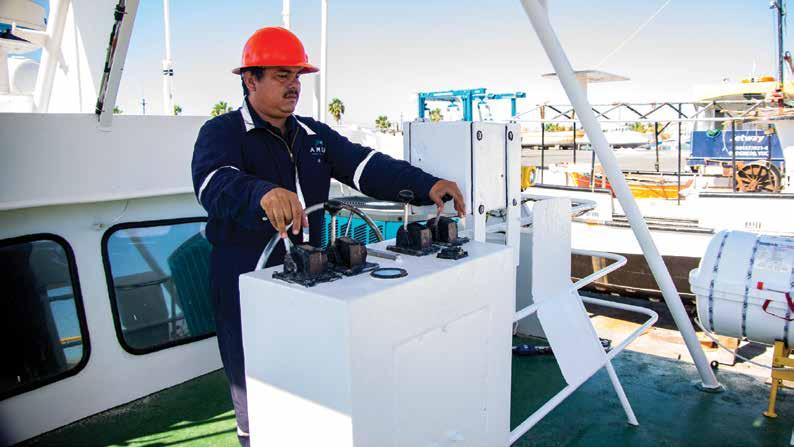
6 minute read
Hacia el recuento sindical en Pemex?
¿Hacia el recuento sindical en Pemex? / Towards a Union Recount in Pemex?
Tras la renuncia de Carlos Romero Deschamps a la Secretaría General del Sindicato de Trabajadores Petroleros de la República Mexicana (STPRM), en estas mismas páginas, señalamos que aún era “muy temprano para saber si esa renuncia desembocará en la ampliación de los cauces democráticos al interior del STPRM”. También, escribimos que no se podía “tener la certeza de que habrá una coyuntura favorable a la libre organización de los petroleros”. Esto es, que los trabajadores de Pemex pudieran optar por la substitución del STPRM por otro sindicato, en la titularidad del contrato colectivo de trabajo.
Following the resignation of Carlos Romero Deschamps from the General Secretary of the Mexican Oil Workers’ Union (STPRM, by its acronym in Spanish), in these same pages, we pointed out that it was still “too early to know if this resignation would lead to the expansion of democratic channels within the STPRM.” We also noted that one could not “be sure that there will be a positive situation for the free organization of the oil experts.” That is that Pemex’s workers could opt for the substitution of the STPRM by another union, in the ownership of the collective work contract.
l momento de escribir estas líneas, las elecciones para renovar la dirigencia del STPRM parecen caminar hacia una posposición indefinida. Mientras, el sindicato Petromex se alista para disputarle la titularidad del contrato colectivo de trabajo.
La efervescencia política generada por la renuncia de Carlos Romero Deschamps, pareciera no corresponder con lo establecido en los estatutos del sindicato. Diversos abogados laboralistas y funcionarios de la Secretaría del Trabajo, han manifestado que la actual dirigencia sindical podría permanecer inamovible hasta el 31 de diciembre de 2024. Claro está que, más allá de esta interpretación de los estatutos, la presión política de los actores interesados en tomar la dirección del sindicato, podría forzar las elecciones internas.
Por lo pronto, la mayoría de quienes buscan contender por la Secretaría General del sindicato, adolecen del problema de no ser reconocidos como trabajadores activos de Pemex, lo que debilita sus aspiraciones. Asimismo, la evidente atomización de la disidencia interna, pareciera augurar que el grupo político de Romero Deschamps seguiría siendo hegemónico a nivel nacional; aunque eventualmente pudiera perder algunas secciones locales.
La posible permanencia de la actual dirigencia del STPRM, refuerza la estrategia seguida por quienes fundaron y lograron el reconocimiento oficial del sindicato Petromex. En efecto, de cerrarse la puerta para la disputa de la dirección del STPRM, varios grupos disidentes podrían optar por integrarse o aliarse con Petromex para disputarle la titularidad del contrato colectivo de trabajo al STPRM.
En este contexto, el 12 de marzo Petromex concretó la instalación formal de su Consejo Consultivo Académico, cuyo Presidente es el Ing. Cuauhtémoc Cárdenas Solórzano. La función de este Consejo, formado por especialistas de diversas áreas relacionadas con el sector petrolero, no es propiamente sindical; sino que busca dotar al naciente sindicato, de una perspectiva de la industria petrolera en general, y de Petróleos Mexicanos, en particular; que pueda ir más allá de lo estrictamente gremial.
Posteriormente, el 17 de marzo, Petromex presentó ante la Junta Federal de Conciliación y Arbitraje la demanda para disputarle al STPRM la titularidad del contrato colectivo de trabajo. De aceptarse, daría inicio un proceso de “recuento” (votación entre los trabajadores sindicalizados de Pemex) que podría marcar un hito en la historia sindical del país. Comparable al que llevó a Demetrio Vallejo a la dirección del Sindicato Ferrocarrilero en 1958... o al que culminó con la derrota del SPAUNAM entre los académicos de la Universidad Nacional en 1979 (y la toma de Ciudad Universitaria por el ejército).
Lo que es innegable, es que el paso dado por Petromex, pondrá a prueba la voluntad del gobierno para empezar a desmontar el corporativismo en la vida sindical de nuestro país. A
At the time of writing these lines, the elections to renew the leadership of the STPRM seem to be moving towards an indefinite postponement. Meanwhile, the Petromex union is getting ready to dispute the ownership of the collective bargaining contract.
The political agitation generated by the resignation of Carlos Romero Deschamps does not seem to match the provisions of the union’s statutes. Various labor lawyers and officials of the Secretary of Labor have stated that the current union leadership could remain in office until December 31, 2024. Of course, beyond this interpretation of the statutes, political pressure from those interested in taking over the union’s leadership could force internal elections.
For now, most of those who seek to fight for the union’s General Secretary suffer from not being recognized as Pemex’s active workers, which weakens their aspirations. Likewise, the clear atomization of internal opposition seems to indicate that Romero Deschamps’ political group will continue to be hegemonic at the national level. However, it may eventually lose some local sections.
The possible survival of the current leadership of the STPRM reinforces the strategy followed by those who founded and achieved official recognition of the Petromex union. In effect, if the door is closed to the conflict of the STPRM’s leadership, various opposing groups could choose to join or ally themselves with Petromex to fight for the ownership of the STPRM’s collective labor contract.
In this context, on March 12, Petromex formally installed its Academic Advisory Council, whose President is Engineer Cuauhtémoc Cárdenas Solórzano. The job of this Council, integrated by specialists from diverse areas related to the oil sector, is not strictly union-related. Still, instead, it seeks to provide the group with a perspective of the oil industry in general, and of Petróleos Mexicanos in particular, that can go beyond the strictly related to the union.
Subsequently, on March 17, Petromex filed a lawsuit with the Federal Conciliation and Arbitration Board to challenge the STPRM’s ownership of the collective bargaining agreement. If accepted, it would initiate a “recount” process (a vote among Pemex’s unionized workers) that could set a milestone in the country’s union history. Similar to the one that led Demetrio Vallejo to the leadership of the Railway Union in 1958... or the one that ended in the defeat of SPAUNAM among the academics of the National University in 1979 (and the takeover of Ciudad Universitaria by the army).
What is undeniable is that the step taken by Petromex will test the government’s willingness to start dismantling corporatism in the union life of our country.
CELEBREMOS NUESTRO ANIVERSARIO



2 AÑOS





Calle 4 Lote 5, Local C y D P.I.P. Laguna Azul. C.P. 24129
Cd. del Carmen, Campeche. México.
+ 52 (938) 118.49.04 ventas@amls.mx











